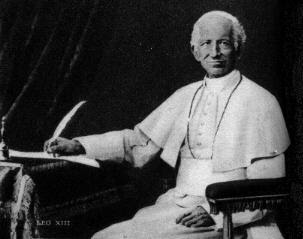Notice:
For our regular readers: We apologize for the lack of material produced in the last few months [again] and regret to announce that the hiatus may last just a little bit longer. A lot has happened in the last few months apart from the internet and so it currently continues, and, as the majority of posts are composed by myself, I am become recently booked with lots of work which keeps me off of the internet much of the time, and therefore, postings have become much more infrequent, and therefore, at least for the present time, the posting schedule here at VITW is suspended, but there is hope that posts will resume soon with the continuation of commentaries on relations between the NO and tradition, particularly between apologists and spokespersons, namely concerning Mr. Shea's recent article on the topic.
For our newer readers: there is an archive of several dozen posts that will hopefully suffice for the duration of the hiatus.
And now, the News:
Original posts of a theological or philosophical nature are being suspended, at least as far as we can tell, indefinitely, however, posts of a cyclopedic, speculatory, or reportial nature will resume as ordinary upon the lifting of the hiatus.
However, you can still visit some of our friends, contributors or colleagues listed in our links lists.
Thanks to all and God Bless.
Friday, September 12, 2008
Thursday, September 11, 2008
Rev. Haydock on the Language of the Liturgy
"Did the word of God first come out from you? This he says, to check these new preachers, by putting them in mind, that they are not the first, nor the only Christians, and so must conform themselves to the discipline practised in other Churches, especially since, as their apostle, he hath delivered them the commandments of the Lord. And if any man know not, will not acknowledge, and follow these rules, he shall not be known; God will not know, nor approve his ways. The pretended reformers, from the expressions with which the apostle blames the abuse some new converts made of the gift of tongues, think they have found a plausible argument to reprehend Catholic, for using the same Latin tongue in the Mass, and in the public liturgy. They consider not, whether they have the same reasons to find fault with the present discipline of the Church, as St. Paul then had to blame the Corinthians: whether the circumstances be the same or different: they think it enough that Latin, which is used in the Mass, is a language not understood by a great many ignorant people, and therefore they can say with St. Paul, that an idiot, or an unlearned man, knows not when to say Amen to what he hears. Two things offer themselves here to the consideration of every man, who is disposed to judge impartially. 1. Whether the same reasons and motives now subsist for blaming the Catholics. 2ndly, whether the conveniences and inconveniences, duly examined, it be found more commendable to perform the public liturgy, in those, which are the most general languages, as in Latin or Greek, or to have all liturgies turned into as many tongues, as the ignorant people understand and speak in different places. As to the first, St. Paul does not absolutely forbid the use of this gift of tongues, that were not understood, even by any one (as hath been already observed). All that he blames is, that many, who valued themselves on this gift, spoke at the same time altogether strange tongues, which none understood, but those who had another gift of the Spirit, called the interpretation of speeches, on which account in these meetings there was nothing but confusion, without any profit, edification, or instruction, at a time, and in such circumstances, when instructions were absolutely necessary, both for the new converted Christians, and also for the infidels, who flocked thither as much as the Christians. The case is now quite different, when none but Catholics meet, (especially at the Mass) who have been instructed from their infancy, what they are to believe, as to the mysteries of faith, and what they ought to practise, as to the commandments, the sacraments, prayer, and other points, which they have in their catechisms, or which have been delivered to them by catechetical discourses and instructions. And if they have been happily converted, or are upon their conversion, they are always carefully instructed in the tongue which they understand, as to what they ought to believe, and in the duties of a Christian life. Besides this, all present are frequently instructed by sermons and exhortations, not only on Sundays and holidays, but daily in Advent and Lent, as it is the custom in Catholic countries. I know some of our adversaries have been persuaded, that we preach in Latin to the people; to be convinced of the contrary, let them come and hear us; it is the worst I wish them. As to the sacrifice of the Mass, which none but they who are priests, can offer for the people, of which also a great part, according to the institution of the Church, as the Council of Trent observes, (session 22. cap. 5.) is said with a low voice: it is not performed in Latin in the Western Church, or in Greek in the East, that the meaning of the words may be concealed, since the same Council has laid an express injunction upon all pastors, and upon all that have care of souls, that they frequently, and especially on Sundays, and holidays, expound to the people, what is contained in the Mass, to wit, the parts, and the ceremonies. See 22nd session, cap. 8.) And this command is again repeated, (session 24. cap. 7.) that they instruct the people in their mother tongue concerning the divine mysteries and sacraments. All that can read, may find the Mass translated into their own language, and the most ignorant are taught and instructed, that by the different parts are represented the death and sufferings of our Saviour, Christ: they are taught how to offer up at the same time their intention, their heart, and their prayers: to confess themselves sinners before God, as the priest does, how they ought to endeavour to praise, and adore Christ with the blessed spirits in heaven; how they ought to beg graces of God, by saying the Lord's prayer; how they ought, at the same time, at least in spirit and desire, to receive the holy sacrament of the eucharist, with a sincere repentance, with humility and devotion. Cannot all things, then, be done to edification, as St. Paul requires, though the words of the Mass, and public liturgy, be in a language which the ignorant do not understand, but which, of all others, is the most general! Now the second thing to be examined is, whether, all things duly considered, it be better to retain the public Church-offices in Latin, and in those ancient dead languages, as they are called, or to turn the liturgy into as many tongues, as are spoken in different places and countries! Our adversaries, by this new alteration which they have made, have gone against the judgment of all Christian Churches, both in the West and East, and in all parts of the world. For as Mons. Simon takes notice, in his Critics, all other Churches (the Protestant only excepted) have judged it expedient, to stick to the words and languages of their ancient liturgies, the Grecians to the ancient Greek, which now the ignorant among them do not understand; the like is to be said of the ancient Syriac, Arabic, Coptic, &c. And it is also observed, that the Israelites continued the reading of the law and the prophets, in the ancient Hebrew, which the common people of the Jews did not understand after their return from the Babylonian captivity. It is well known that Latin in this part of the world, is more generally spread and known, than any other language whatsoever. It is taught every where in all public schools. It is learnt, not only by the ministers of the Church, but by almost all gentlemen, and by persons of all conditions, the poorer sort only excepted. There is this great convenience, that the same priest can perform all the public Church-offices, in all places and kingdoms where he travels. All the faithful, whithersoever they have occasion to go, meet with the same Mass, and liturgy in the same words abroad, which they were accustomed to hear at home. The same uniformity is every where preserved without change or confusion. But according to the method introduced by the Protestants, the liturgy must be changed into as many different tongues, as there are countries and places, and in almost every century, as we see by experience, languages are liable and subject to considerable changes and alterations. From hence arises a danger of changes, as to the doctrine and belief of the faithful: errors and heresies are the consequences, that follow such frequent changes, especially, when by another false principle of the said reformers, every private man and woman has a right to expound the hard and obscure place of the holy Scriptures, which make up the chief and greatest part of all public liturgies in all Christian Churches. I might ask of the Protestants, whether the ignorant people at lest, and idiots, as St. Paul calls them, understand the meaning of the Psalms, when they are sung in Hopkins's rhymes; though they may perhaps know when to say Amen, with the rest. Nor yet does every ignorant man know what the word itself, Amen, signifies, and therefore knows not what he answers. I cannot but here take notice of an unfair way of proceeding, even in the best Protestant translation, by sometimes adding in this chapter the word unknown, and sometimes omitting it. All Catholics are willing to allow, that by the gift of speaking tongues, St. Paul means tongues unknown, though the word unknown is not found so much as once, neither in the Latin, nor even so much as in any one Greek manuscript. The Protestant translators, for tongues, have put unknown tongues, in all the verses, where St. Paul blames the abuse of this gift; to wit, ver. 2. 4. 13. 14. 19. 27. but they make no such addition, where St. Paul either commends, or permits the speaking in tongues not understood, as ver. 5. where he says, I would have you to speak tongues; and ver. 29. where he says, forbid not to speak tongues. It is evident, that there is the very same reason for the addition, or the omission equally in all these verses. Is this to translate faithfully? I would by no means judge rashly, even of any adversary; but it looks as if both the addition and omission was with a design of making this popular objection seem to be of greater force against this point of discipline, and practice of the Catholics, and indeed of all Christian Churches." (Witham)
- Haydock Bible Commentary on I Cor. Ch. XIV, Ver. 36-38.
Subscribe to:
Posts (Atom)















